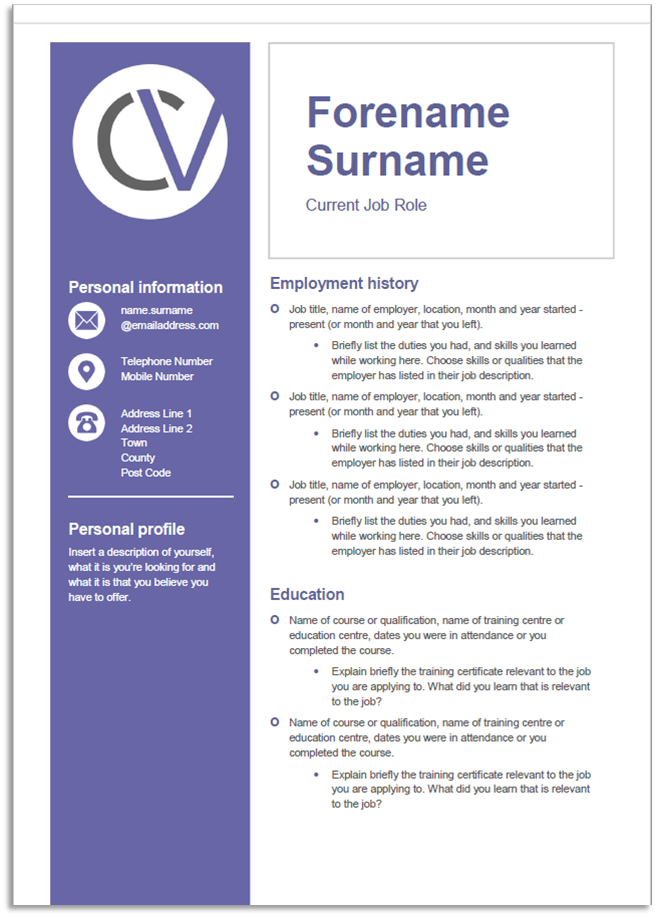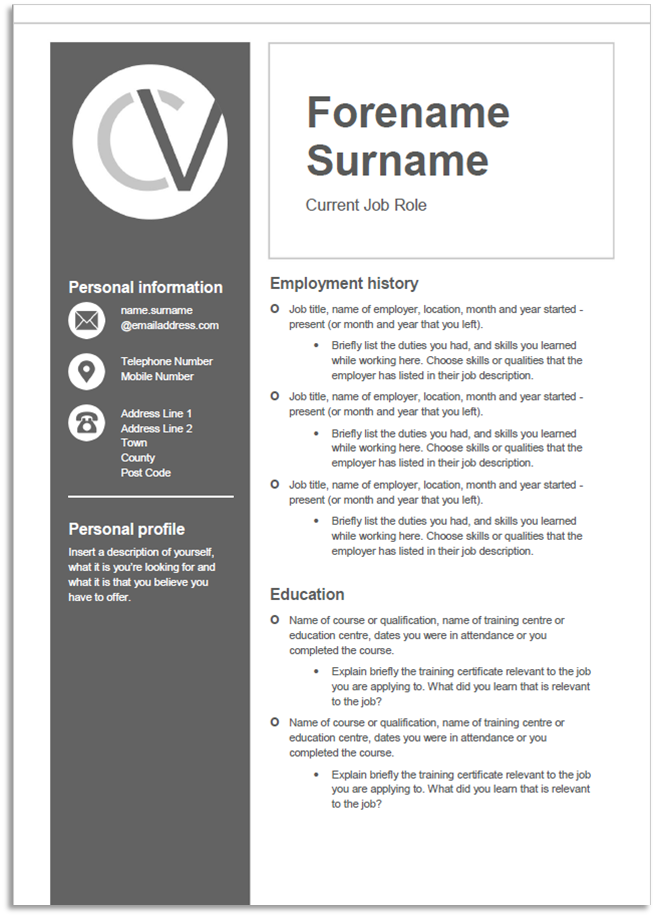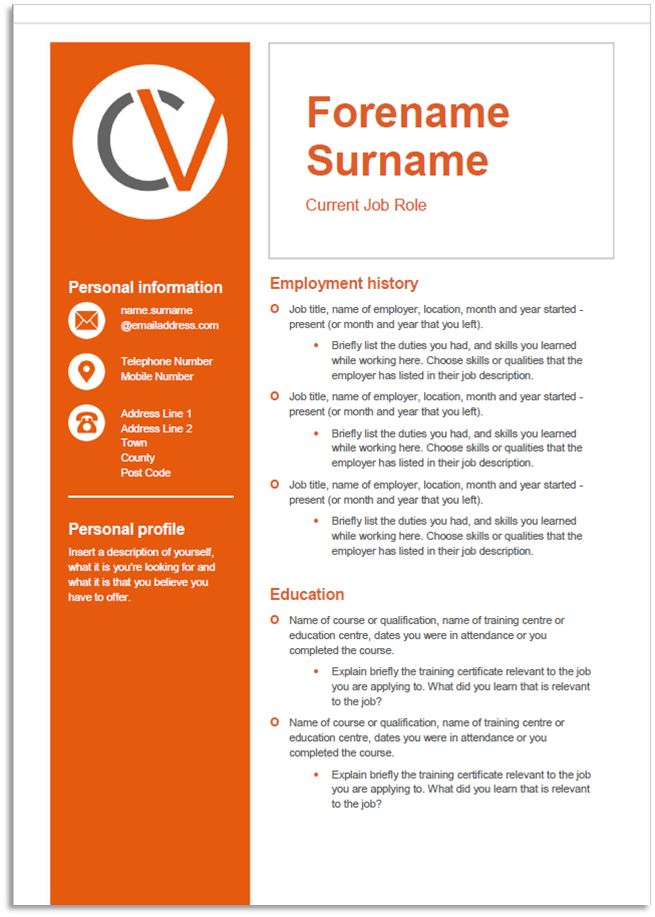If you have a passion for customer service, work well under pressure and are eager to learn, you’ll make an excellent Barista, Bartender or Waiter/Waitress.
You don’t need any formal qualifications, but any experience in the hospitality and catering sector, will look great on your CV and help you stand out.
Our free CV template is tailored to help you write the best CV to land your dream job.
A guide to writing a CV for Baristas, Waiters, Waitresses and Bartenders
FIRST AND SECOND NAME
Home number | Mobile number
Emailaddress@email.com
Home address, Home Street
Home Town
Postcode
Personal Profile
In the personal profile, you should professionally introduce yourself, in three or four sentences, with relation to the job you’re applying to.
A good personal profile will include: your current work situation, what type of work you are searching for (such as part-time, flexible hours, or full-time employment starting immediately) some key skills and/or traits that will show the potential employer that you are a good candidate for the advertised job.
Are you a waiter who is looking to transition to being a barista or bartender? Mention any experience you have had behind the bar or using the espresso machines where you work.
Are you a waiter or bartender looking to transition to a supervisor or management position? Highlight your leadership and problem solving skills here.
EXAMPLE:
I am a precise, hard-working and reliable barista, with two years’ experience, looking for a challenging full-time role. I work well under pressure and enjoy the fast pace of busy moments. I enjoy working in a team to help produce a great experience for all customers.
Work History
The work history section is to show the potential employer what jobs or work experience you’ve done. It is the first chance for you to highlight the skills and experience each one has given you, and this is turn should show why you are a good fit for the job you’re applying for. Try to pick out the achievements you are most proud of. You can always write down and save your examples or other relevant skills for the interview.
- Job title, name of employer, location, month and year started – present (or month and year that you left)
- Briefly list the duties you had, and skills you learned while working here. Choose skills or qualities that the employer has listed in their job description
EXAMPLE:
- Barista, Roastworks Coffee Co, London, January 2017 – present
- Responsible for taking customer orders, pouring espressos, and completing orders with milk. I have also helped serve customers on the floor and had training in machine maintenance and stock ordering for the section.
What jobs should you include?
- Try to include your work history for the last five years. If you haven’t been working for that long, that is okay. It will be explained by the education history. If you have recently moved to the country, it’s okay to include employment in other countries. There is more advice on work and education history in our top CV tips online article.
- Any jobs you’ve had in the hospitality or retail sectors will be useful to include here as lots of the skills will overlap and show you’re a good candidate for the role.
- If you have recently left education, or are new to this type of work, try to include any jobs you’ve had that will highlight the skills the employer is looking for. For example, if you have worked on a shop floor, use this to show you have experience serving customers on the till, which will be helpful in this role
Education History
In education history, this is a chance to show any relevant training you have done, what skills you have learned from your courses, as well as general education subjects you’ve done. As you get more work experience, this section will become shorter, as your work history becomes more relevant and more recent.
You don't need any specific qualifications to be a Barista, although a good standard of Maths and English is expected. If you've completed any courses in hospitality and catering, coffee training or mixology, do list them here as it will of course help you stand out from the crowd.
Additionally, if you have completed courses or gained certificates in food safety, COSHH (Control of Substances Hazardous to Health) or first aid, include that information here too.
- Name of course or qualification, name of training centre or education centre, dates you were in attendance or you complete the course
- Explain briefly the training certificate relevant to the job you are applying to. What did you learn that is relevant to the job?
EXAMPLE:
- Level 2 VRQ barista skills, London School of Coffee, November 2016
- Learned about the fundamentals of espresso, grinding, steaming milk, filter coffee, tea, hot chocolates and other beverage skills
Skills
Here is your chance to highlight the best skills you have in relation to the job you’re applying for. Hint: these will be the skills listed in the job advert, but only highlight the skills you have. Misleading information on your CV is likely to trip you up in an interview and is unprofessional; you don’t have to show you have every last skill listed in the job advert to be successful.
EXAMPLE:
- Espresso – ‘I have a good knowledge and skills in brewing shots to order, adjusting brewing variables and tasting to make sure shots are up to standard.’
- Customer service – ‘I have learned to communicate with customers effectively to make sure they get their coffee exactly as they like it. When time allows I also enjoy making the customers feel welcome and enjoy conversing with them.’
References
First and last name
Job title and relation to you in the work place (if it isn’t obvious from the job title), name of work place, work contact number (or main company phone number which they can be reached through) and work email address
EXAMPLE:
Jack Jones
Manager, Roastworks Coffee Co
0000 0000 00
jackjones@email.com
Who should you include as a reference?
- Your first reference should ideally be from your supervisor who you’ve been working closely with in your most recent role. The second reference can be from a current colleague, or line manager or supervisor from a previous job. It’s best practice to ask someone if they will be a reference for you before they are contacted. Be aware that not all employers actually contact references, but it’s important to have them available if needed
- It’s important to remember that while you are in your current job, consider that you may not want your reference (eg. your current boss) to be contacted until you have had an interview for a new possible job, or are actually offered it. This is because, for instance, if you weren’t offered the new job, and end up staying in your current job then you might not want your manager having been contacted as a reference. It can cause tension or awkward conversations about why you were trying to leave. A good way to get around this is to simply write ‘References available on request’. This shows the new employer that they can ask you for them as needed, but also means you can ask them to only contact them if you are offered the job, and then have time to ask the reference if it’s okay for them to be contacted. Most potential employers will be happy to wait to do this after offering you the job
- If you have only had one previous job, or have been studying, it is okay to include a tutor as a reference, or someone else as a character reference (who is not related to you)





